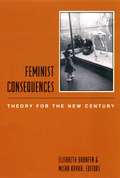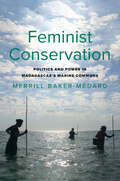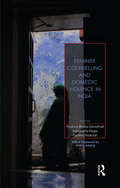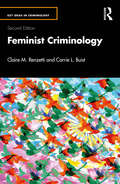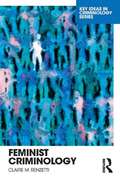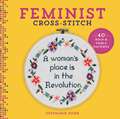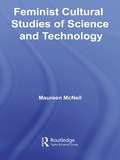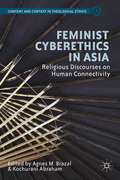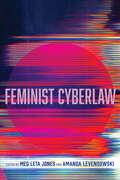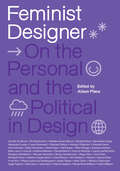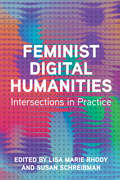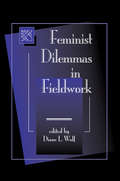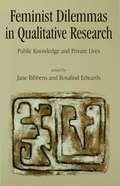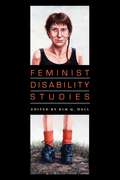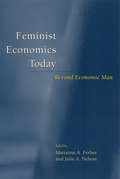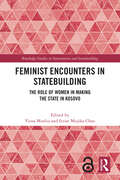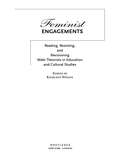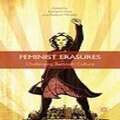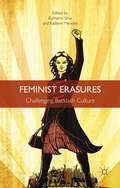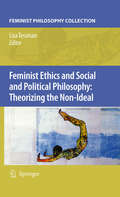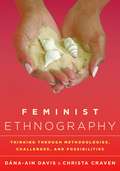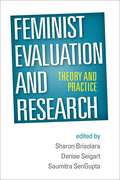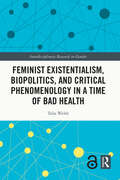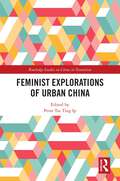- Table View
- List View
Feminist Consequences: Theory for the New Century (Gender and Culture Series)
by Misha Kavka Eds. Bronfen ElisabethExploring the status of feminism in this "postfeminist" age, this sophisticated meditation on feminist thinking over the past three decades moves away from the all too common dependence on French theorists and male thinkers and instead builds on a wide-ranging body of feminist theory written by women.These writings address the question "Where are we going?" as well as "Where have we come from?" As evidenced in the essays compiled here, the multiplicity of directions available to this new feminism ranges from poststructuralist academic theory through cultural activism to re-readings of law, literature, and representation. Contributors include Mieke Bal, Lauren Berlant, Rosi Braidotti, Elisabeth Bronfen, Judith Butler, Rey Chow, Drucilla Cornell, Ann Cvetkovich, Jane Gallop, Beatrice Hanssen, Claire Kahane, Ranjana Khanna, Biddy Martin, Juliet Mitchell, Anita Haya Patterson, and Valerie Smith.Feminist Consequences, representing the forefront of international feminist thought, marks a new and long-desired stage of feminist criticism where women are themselves making theory rather than reacting to male production.
Feminist Conservation: Politics and Power in Madagascar's Marine Commons (Yale Agrarian Studies Series)
by Merrill Baker-MedardHow access to and control over marine resources in Madagascar are negotiated, and the inextricable link between equity and sustainability As marine conservation becomes an increasingly urgent issue around the world, there is an equally critical need to understand the ways different conservation interventions attend to or exacerbate social inequality. This book explores the origins of a conservation agenda in Madagascar and the consequences of its neglect of gender. Drawing on interviews, ecological and social surveys, archival research, and several years of living with fishers in Madagascar, Merrill Baker-Médard examines how access to and control over marine resources are negotiated from fishing villages to the conference rooms of international meetings. Her intersectional approach bridges conservation science, gender studies, and human geography to advance the idea that equity and sustainability are inextricably linked and that practices of reciprocity, accountability, and care are foundational to their achievement.
Feminist Constitutionalism: Global Perspectives
by Beverley Baines Daphne Barak-Erez Tsvi KahanaConstitutionalism affirms the idea that democracy should not lead to the violation of human rights or the oppression of minorities. This book aims to explore the relationship between constitutional law and feminism. The contributors offer a spectrum of approaches and the analysis is set across a wide range of topics, including both familiar ones like reproductive rights and marital status, and emerging issues such as a new societal approach to household labor and participation of women in constitutional discussions online. The book is divided into five parts: I) feminism as a challenge to constitutional theory; II) feminism and judging; III) feminism, democracy, and political participation; IV) the constitutionalism of reproductive rights; V) women's rights, multiculturalism, and diversity. As a collection, the book seeks to examine, challenge and indeed redefine the very idea of constitutionalism from a feminist perspective and VI) women between secularism and religion.
Feminist Counselling and Domestic Violence in India
by Padma Bhate-Deosthali; Sangeeta Rege; Padma PrakashMainstream counselling in domestic violence often fails to address critical issues, such as gender socialisation processes and the abuse of power that allows violence against women, and focuses primarily on the intra-psychic nature of individual women. In contrast, feminist counselling is an effective alternative model, owing to its ability to address the fundamental correlation of abuse with power. In going beyond the individual, it helps women locate the source of their distress in the larger social context of power and control, manifesting in intimate, interpersonal relationships, and enables them to resist systemic oppression.This volume offers one of the first systematic documentations of feminist psychosocial interventions in India. It situates the issue of domestic violence in the historical context of the women’s movement, and examines institutional factors such as family and marriage that perpetuate abuse. Using extensive case studies, it discusses the methods, principles, techniques, skills and procedures followed by feminist organisations across the country, and their role in women’s empowerment. The book will serve as a practical reference guide to practitioners such as social workers, counsellors and para-counsellors, health activists, grassroots workers, protection officers and service providers. It will also be useful to scholars and students of psychology, sociology, women’s studies, law and public policy.
Feminist Criminology (Key Ideas in Criminology)
by Claire M. Renzetti Carrie L. BuistThis revised and updated second edition traces the growth of feminist criminology from the 1970s to the present, examining the diversity of feminist criminologies that have developed, the ways they have responded to and built on one another, and the future directions for research and activism to which they point us.Feminist criminology grew out of the Women’s Movement of the 1970s, in response to the male, heteronormative dominance of mainstream criminology—which meant that not only were women largely excluded from carrying out criminological research but they were also rarely considered as subjects of that research. Other groups were also marginalized by the mainstream, either discussed with stereotypical framing or overlooked completely. While showing how feminist perspectives have made a significant impact on the discipline, the academy, and the criminal legal system, this book also highlights the limits of this influence. In doing so, it explores answers to key questions, such as how much feminist criminology has transformed research and knowledge production, education, and practice, and how feminist criminologists can continue to shape the future of the discipline.Feminist Criminology will be of great value to undergraduate and graduate students as well as faculty, researchers, and practitioners.
Feminist Criminology (Key Ideas in Criminology)
by Claire M. RenzettiFeminist criminology grew out of the Women’s Movement of the 1970s, in response to the male dominance of mainstream criminology – which meant that not only were women largely excluded from carrying out criminological research, they were also barely considered as subjects of that research. In this volume, Claire Renzetti traces the development of feminist criminology from the 1970s to the present, examining the diversity of feminisms which have developed: liberal feminist criminology Marxist, radical and socialist feminist criminologies structured action theory left realism postmodern feminism black/multiracial feminist criminology. She shows how these perspectives have made a great impact on the discipline, the academy, and the criminal justice system, but also highlights the limitations of this influence. How far has feminist criminology transformed research and knowledge production, education, and practice? And how can feminist criminologists continue to shape the future of the discipline?
Feminist Cross-Stitch: 40 Bold & Fierce Patterns
by Stephanie RohrMake a statement—and smash the patriarchy, one stitch at a time—with these 40 feminist-themed cross-stitching patterns! Crafty activists will love this snarky book with its 40 irreverent, vintage-inspired cross-stitch patterns. Whether you want to proudly announce to the world that you're a nasty woman or remind others that a woman's place is in the revolution, you&’ll find edgy slogans, sharp one-liners, and cheeky images that make fabulous wall art or wonderful handmade gifts. An illustrated basics section will get you started, with information on materials, tools, techniques, and framing your finished pieces.
Feminist Cultural Studies of Science and Technology (Transformations)
by Maureen McNeilFeminist Cultural Studies of Science and Technology challenges the assumption that science is simply what scientists do, say, or write: it shows the multiple and dispersed makings of science and technology in everyday life and popular culture. This first major guide and review of the new field of feminist cultural studies of science and technology provides readers with an accessible introduction to its theories and methods. Documenting and analyzing the recent explosion of research which has appeared under the rubric of 'cultural studies of science and technology' it examines the distinctive features of the 'cultural turn' in science studies and traces the contribution feminist scholarship has made to this development. Interrogating the theoretical and methodological features it evaluates the significance of this distinctive body of research in the context of concern about public attitudes to science and contentious debates about public understanding of and engagement with science.
Feminist Cyberethics in Asia
by Agnes M. Brazal Kochurani AbrahamThe Asian continent which is composed of tiger and emerging economies, is both a big producer and consumer of computer mediated communication. Research on cyberspace in the Asian context, however, began only after the 1990's when the digital revolution spread outside the West. These initial studies which were largely dependent on Western categories, did not probe into the socio-cultural contexts in which the technologies emerged and have developed. This has changed though in the past years. This anthology hopes to contribute, in particular, to the analysis of the mutually constitutive interaction of the use of cyberspace and Asian cultures, with particular attention to ethical, feminist, and religious perspectives especially within Catholic Christianity. Core themes discussed in the contributors' essays are the democratizing potential of cyberspace, the digital/gender divide, global division of digital/virtual labor, cyber-violence against women, women's resistance as well as collusion with masculinist capitalist interests on the Net, masquerading, just internet relations, how web 2. 0 spaces are shaping dynamics of power and authority in the church, cyberspace as sacred time and space, and models of spirituality for the digital era.
Feminist Cyberlaw
by Meg Leta Jones and Amanda LevendowskiA free ebook version of this title is available through Luminos, University of California Press's Open Access publishing program. Visit www.luminosoa.org to learn more. This vibrant and visionary reimagining of the field of cyberlaw through a feminist lens brings together emerging and established scholars and practitioners to explore how gender, race, sexuality, disability, class, and the intersections of these identities affect cyberspace and the laws that govern it. It promises to build a movement of scholars whose work charts a near future where cyberlaw is informed by feminism.
Feminist Designer: On the Personal and the Political in Design
by Alison PlaceA bold and timely collection that brings feminist theory and critical thinking to life through vital, approachable design methods and practices.Feminist Designer brings together a constellation of voices and perspectives to examine the intersection of design and feminist theory. For decades, the feminist refrain within design has hinged on the representation and inclusion of women in the field. This collection, edited by Alison Place, however, is a call to move beyond this narrow application. Feminist design is not just about who does design—it is about how we do design and why. Feminist frameworks for design activism are now more relevant than ever, as they emphasize collaborative processes that aim to disrupt and dismantle power hierarchies while centering feminist ways of knowing and doing. The first book in nearly three decades to address such practices in design, Feminist Designer contains essays, case studies, and dialogues by 43 contributors from 16 different countries. It engages a wide variety of design disciplines, from graphic design to disability design to algorithmic design, and explores key feminist themes, such as power, knowledge, care, plurality, liberation, and community. Through diverse, sometimes conflicting, intersectional perspectives, this book contributes new design methods informed by a multiplicity of feminisms that confront design&’s patriarchal origins while ushering in new pathways for making critical and meaningful change.ContributorsJennifer Armbrust, Dina Benbrahim, Madeline Avram Blount, Elizabeth Byrd, Benedetta Crippa, Alexandra Crosby, Laura Devendorf, Rachael Dietkus, Ashley K. Eberhart, Griselda Flesler, Aimi Hamraie, Gaby Hernández, Alexis Hope, Jeff Kasper, Ellen Kellogg, Aasawari Kulkarni, Eden Laurin, Una Lee, Andrew Mallinson, Claudia Marina, Victor G. Martinez, Lauren Lee McCarthy, Margaret Middleton, Maryam Mustafa, Becky Nasadowski, Maya Ober, Nina Paim, Elizabeth Pérez, Heather Snyder Quinn, Cami Rincón, Jenn Roberts, Velvet A. Johnson Ross, In-ah Shin, Marie Louise Juul Søndergaard, Ayako Takase, Attia Taylor, Rebecca Tegtmeyer, Aggie Toppins, Ilaria Vanni, Joana Varon, Manon Vergerio, Mandy Harris Williams, Sarah Williams
Feminist Digital Humanities: Intersections in Practice (Topics in the Digital Humanities)
by Susan Brown Susan Schreibman Laura Mandell Jacqueline Wernimont Nanna Bonde Thylstrup Kristin Veel Daniela Agostinho Astrid Von Rosen Monika Barget Ravynn K. Stringfield Tanya E. Clement Jaime Lee Kirtz Nikki L. Stevens Jenny Bergenmar Cecilia Lindhé Katrine Dirckinck-Holmfeld Mark Sample Lisa Marie Rhody Dhanashree Thorat Andie SilvaFeminist digital humanities offers opportunities for exploring, exposing, and revaluing marginalized forms of knowledge and enacting new processes for creating meaning. Lisa Marie Rhody and Susan Schreibman present essays that explore digital humanities practice as rich terrain for feminist creativity and critique. The editors divide the works into three categories. In the first section, contributors offer readings that demonstrate how feminist thought can be put into operation through digital practice or via analytical approaches, methodologies, and interpretations. A second section structured around infrastructure considers how technologies of knowledge creation, publication, access, and sharing can be formed or reformed through feminist values. The final section focuses on pedagogies and proposes feminist strategies for preparing students to become critical and confident readers with and against technologies. Aimed at readers in and out of the classroom, Feminist Digital Humanities reveals the many ways scholars have pushed beyond critique to practice digital humanities in new ways. Contributors: Daniela Agostinho, Monika Barget, Jenny Bergenmar, Susan Brown, Tanya E Clement, Katrine Dirckinck-Holmfeld, Jaime Lee Kirtz, Cecilia Lindhé, Laura Mandell, Lisa Marie Rhody, Mark Sample, Susan Schreibman, Andie Silva, Nikki L. Stevens, Ravynn K. Stringfield, Dhanashree Thorat, Nanna Bonde Thylstrup, Kristin Veel, Astrid von Rosen, and Jacqueline Wernimont
Feminist Dilemmas In Fieldwork
by Diane L. WolfFieldwork poses particular dilemmas and contradictions for feminists because of the power relations inherent in the process of gathering data and implicit in the process of representation. Although most feminist scholars are committed to seeking ethical ways to analyze women and gender, these dilemmas are especially acute in fieldwork, where research often entails working with those who are in less privileged positions than the researcher. Despite attempts by feminist scholars to conduct more interactive and egalitarian research, they have rarely been able to disrupt the hierarchies of power. This book offers an interdisciplinary exploration of the kinds of dilemmas feminist researchers have confronted in the field, both in the United States and in Third World countries. Through experientially based writings, the authors unravel the contradictions stemming from their multiple positions as "insiders," "outsiders," or both, and from attempts to equalize the research relationship and, in some cases, to ameliorate the situation of those studied. The introductory essay includes an extensive review of the literature.
Feminist Dilemmas in Qualitative Research: Public Knowledge and Private Lives (Feminist Theory Ser.)
by Rosalind Edwards Jane RibbensHow can researchers produce work with relevance to theoretical and formal traditions and requirements of public academic knowledge while still remaining faithful to the experiences and accounts of research participants based in private settings? Feminist Dilemmas in Qualitative Research explores this key dilemma and examines the interplay between theory, epistemology and the detailed practice of research. It does this across the whole research process: access, data collection and analysis and writing up research. It goes on to consider ways of achieving high standards of reflexivity and openness in the strategic choices made during research, examining these issues for specific projects in an open and accessible style. Particular themes examined are: the research dilemmas that occur from feminist perspectives in relation to researching private and personal social worlds; the position of the researcher as situated between public knowledge and private experience; and the dilemmas raised for researchers seeking to contribute to academic discourse while remaing close to their knowledge forms.
Feminist Disability Studies
by Kim HallDisability, like questions of race, gender, and class, is one of the most provocative topics among theorists and philosophers today. This volume, situated at the intersection of feminist theory and disability studies, addresses questions about the nature of embodiment, the meaning of disability, the impact of public policy on those who have been labeled disabled, and how we define the norms of mental and physical ability. The essays here bridge the gap between theory and activism by illuminating structures of power and showing how historical and cultural perceptions of the human body have been informed by and contributed to the oppression of women and disabled people.
Feminist Economics Today: Beyond Economic Man
by Marianne A. Ferber and Julie A. NelsonThe 1993 publication of Marianne A. Ferber and Julie A. Nelson's Beyond Economic Man was a landmark in both feminist scholarship and the discipline of economics, and it quickly became a handbook for those seeking to explore the emerging connections between the two. A decade later, this book looks back at the progress of feminist economics and forward to its future, offering both a thorough overview of feminist economic thought and a collection of new, high-quality work from the field's leading scholars.
Feminist Encounters in Statebuilding: The Role of Women in Making the State in Kosovo (Routledge Studies in Intervention and Statebuilding)
by Vjosa Musliu Itziar Mujika ChaoThis volume provides one of the first comprehensive feminist readings of international statebuilding, with a specific focus on the case of Kosovo.Rather than simply showing how the state in Kosovo is being built by and through women and feminist encounters, this volume is interested to problematise women and feminist subjectivities vis-à-vis the state and statebuilding. The book challenges three main arguments related to the processes and subjects of statebuilding in Kosovo. First, the academic literature on Kosovo has a tendency to take the international intervention of 1999 as the originary point of statebuilding processes in Kosovo. Second, and relatedly, given Kosovo's unprecedented exposure to Western intervention and statebuilding, the majority of works start from the presumption that liberal interventionism in Kosovo (and elsewhere) is normatively more progressive than the previous system, and that the liberal interventionism and statebuilding are naturally gender progressive and gender-equal. The third argument has to do with the existing legal architecture on gender and women’s rights in contemporary Kosovo. The aim of the volume is to, on the one hand, problematise the evidence against the backdrop of everyday manifestations and/or performances of statebuilding and on the other hand interrogate the co-constitutive gender aspect. In terms of methodology, the volume brings together contributions that rely on traditional and multi-sited ethnography, and narrative research rooted in projects and initiatives in Kosovo. This allows the contributors to unearth new and silenced actors, entry points, subjects and subjectivities in processes of and related to statebuilding in Kosovo; feminist frictions and challenges to statebuilding in Kosovo; as well as encounters of heteronormative statebuilding.This book will be of much interest to students of statebuilding, Balkan politics, feminisms, and international relations, in general.The Open Access version of this book, available at www.taylorfrancis.com, has been made available under a Creative Commons Attribution-Non Commercial-No Derivatives (CC-BY-NC-ND) 4.0 International license.
Feminist Engagements: Reading, Resisting, and Revisioning Male Theorists in Education and Cultural Studies
by Kathleen WeilerFeminist Engagements is a collection of essays by some of the top names in feminist education, in which they read and revision the works of the major twentieth-century theorists in education and cultural studies.
Feminist Erasures
by Kumarini Silva Kaitlynn MendesFeminist Erasures presents a collection of essays that examines the state of feminism in North America and Western Europe by focusing on multiple sites such as media, politics and activism. Through individual examples, the essays reveal the extent to which feminism has been made (in)visible and (ir)relevant in contemporary Western culture.
Feminist Erasures: Challenging Backlash Culture
by K. Silva K. MendesFeminist Erasures presents a collection of essays that examines the state of feminism in North America and Western Europe by focusing on multiple sites such as media, politics and activism. Through individual examples, the essays reveal the extent to which feminism has been made (in)visible and (ir)relevant in contemporary Western culture.
Feminist Ethics and Social and Political Philosophy: Theorizing the Non-Ideal
by Lisa TessmanFeminist Ethics and Social and Political Philosophy: Theorizing the Non-Ideal is a collection of feminist essays that self-consciously develop non-idealizing approaches to either ethics or social and political philosophy (or both). Characterizing feminist ethics and social and political philosophy as marked by a tendency to be non-idealizing serves to thematize the volume, while still allowing the essays to be diverse enough to constitute a representation of current work in the fields of feminist ethics and social and political philosophy. Each of the essays either serves as an instance of work that is rooted in actual, non-ideal conditions, and that, as such, is able to consider any of the many questions relevant to subordinated people; or reflects theoretically on the significance of non-idealizing as an approach to feminist ethics or social and political philosophy. The volume will be of interest to feminist scholars from all disciplines, to academics who are ethicists and political philosophers as well as to graduate students.
Feminist Ethnography: Thinking through Methodologies, Challenges, and Possibilities
by Christa Craven Dána-Ain Davis Davis CravenWhat is feminist ethnography? What is its history? How can its methods be applied? How is feminist ethnography produced, distributed, and evaluated? How do feminist ethnographers link their findings to broader publics through activism, advocacy, and public policy? Investigating these questions and more, this cross-cultural and interdisciplinary new text employs a problem-based approach to guide readers through the methods, challenges, and possibilities of feminist ethnography.
Feminist Evaluation and Research
by Saumitra Sengupta Denise Seigart Sharon BrisolaraThis thought-provoking book explores the 'whats,' 'whys,' and 'hows' of integrating feminist theory and methods into applied research and evaluation practice. Illustrative cases drawn from U.S. and international studies address a range of social and health issues. The book provides an overview of feminist theory and research strategies as well as detailed discussions of how to use a feminist lens, practical steps and challenges in implementation, and what feminist methods contribute to research and evaluation projects. Reflections at the close of each section invite the reader to consider key questions and common themes across the chapters. With a focus on social justice models, the book covers ways to conduct feminist research and evaluation in effective, innovative, and culturally competent ways in diverse social and cultural contexts.
Feminist Existentialism, Biopolitics, and Critical Phenomenology in a Time of Bad Health (Interdisciplinary Research in Gender)
by Talia WelshThis book explores the personal value of healthy behavior, arguing that our modern tendency to praise or blame individuals for their health is politically and economically motivated and has reinforced growing health disparities between the wealthy and poor under the guise of individual responsibility. We are awash in concerns about the state of our health and recommendations about how to improve it from medical professionals, public health experts, and the diet-exercise-wellness industry. The idea that health is about wellness and not just preventing illness becomes increasingly widespread as we find out how various modifiable behaviors, such as smoking or our diets, impact our health. In a critical examination of health, we find that alongside the move toward wellness as a state that the individual is responsible to in part produce, there is a roll-back of public programs. This book explores how this "good health imperative" is not as apolitical as one might assume. The more the individual is the locus of health, the less structural and historical issues that create health disparities are considered. Feminist Existentialism, Biopolitics, and Critical Phenomenology in a Time of Bad Health’s charts the impact of the increasing shift to a model of individual responsibility for one’s health. It will benefit readers who are interested to think critically about normalization to produce "healthy bodies." In addition, this book will benefit readers who understand the value of personal health, but are wary of the ways in which health can be used as a tool to discriminate and fuel inequalities in health care access. This volume is primarily of interest to academics, students, public health and medical professionals, and readers who are interested in critically examining health from philosophical perspective in order to understand how we can celebrate the value of healthy behavior without reinforcing discrimination.
Feminist Explorations of Urban China (Routledge Studies on China in Transition)
by Tsz Ting Ip, PennThis book explores gender topics related to social transitions and social struggles in the context of the urban transformations accompanying the evolving political economy of China’s New Era, here defined as the period since 2017.Analyzing a range of feminist perspectives, and empirically based feminist research, this book investigates the ways in which national policies and campaigns imposed under the discursive political framing of the New Era seep into the everyday lives of people, influencing how societies are transformed and how urban spaces, gendered social practices, lived experiences, and subjectivities are being (re)shaped and modified. Through explorations of these aspects of the New Era, this book reveals the new challenges and possibilities faced by different gendered social groups in contemporary Chinese society.Providing rich deliberations on gender topics related to urban developments in China’s New Era, this book will be of great interest to students and scholars of China studies, gender and women’s studies, and urban studies.
